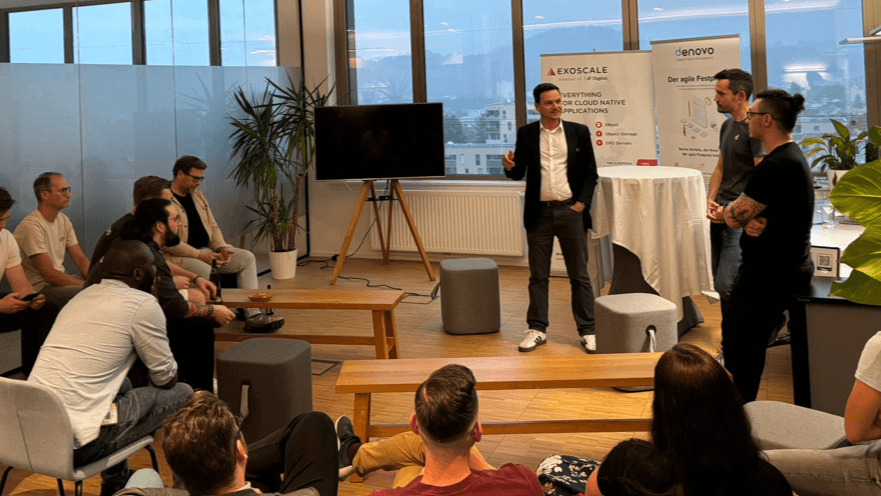A Glimpse into the Future of AI in DevOps and Sovereignty
Sometimes you need to do new things. I never had the chance to look into DevOps, never had the eagerness to learn a coding language. Yeah, I did some JavaScript (and a bit of Java), but just a little, very little to be honest. So I was rather nervous being in a room (or better said, in the hallway of a pretty cool office) at a recent Meetup in Graz (thanks Exoscale & Denovo for hosting this). So far so good, but what was the question?

If you moderate, you need to stay focused on what is being said. Let’s start again: I had the privilege of leading a panel discussion on a deceptively simple question: What happens to Dev
Ops when AI can write the code itself?
The conversation quickly moved beyond technicalities. It touched on the future of work, the role of human expertise in an age of automation, and the strategic importance of sovereignty in Europe’s digital infrastructure. For CEOs and business leaders, these are not abstract questions. They are about how companies remain competitive, compliant, and credible in a landscape that is shifting faster than traditional governance models can adapt.
From Builders to Guides
AI is now capable of generating pipelines, scripts, and even full software modules. For many, this raises the specter of replacement: if machines can code, what role remains for DevOps professionals? The answer is not disappearance, but evolution. The DevOps role is shifting from writing code to ensuring that code, whether written by humans or machines, is explainable, transparent, and aligned with business goals. In other words, DevOps is moving from pure engineering to strategic stewardship. For leaders, the implication is profound. The competitive advantage will not come from the speed at which code is produced, but from the confidence with which it can be trusted, deployed, and governed.
Why Sovereignty is Not Optional
This is where cloud sovereignty enters the picture. Most companies today run on infrastructures that are global, scalable, and powerful. But they are also opaque and often outside European jurisdiction. This creates dependencies that may be invisible today but will become vulnerabilities tomorrow: data residency, regulatory compliance, and the ability to control critical digital processes.
Some key topics we were able to go into a solution finding, now exclusively available for you:
AI will not replace humans in DevOps, but it will change what they do. Their value lies increasingly in guidance, validation, and governance.
Cloud sovereignty is the foundation of digital resilience. Without it, speed turns into dependency; with it, innovation becomes sustainable.
Europe has the strength to build its own operational models. Ones that combine technical excellence with regulatory clarity and cultural trust.
Last but Most Important: Room for Humans Always
AI may generate, but humans must define. AI may accelerate, but humans must steer. In the end, there will always be a necessity for human judgment in the loop. That is not a weakness of our systems. It is their greatest strength.
